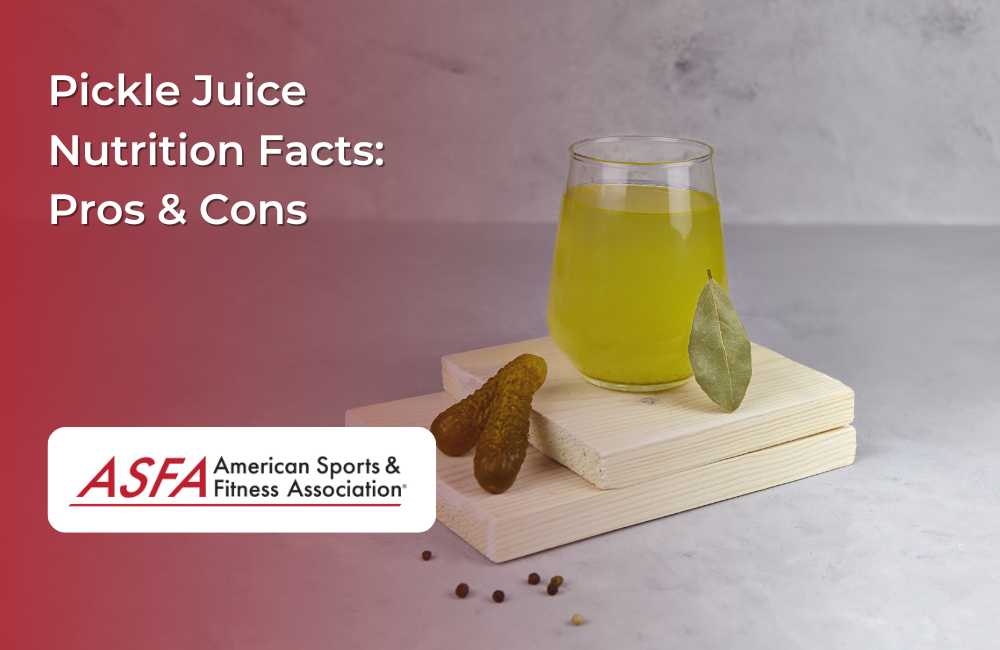Pickle juice is the briny liquid left over after pickling cucumbers in vinegar, water, salt, and spices. It is commonly consumed for its electrolytes, hydration benefits, and muscle recovery properties, but its high sodium content may not be suitable for everyone.
Pickle Juice Nutrition Facts: Pros and Cons of its Nutritional Profile
One cup (240 ml) of pickle juice provides:
-
Calories: 0-15
-
Carbohydrates: 0-2 grams
-
Fiber: 0 grams
-
Sugar: 0-2 grams (varies by brand)
-
Protein: 0 grams
-
Fat: 0 grams
-
Sodium: 800-1200 mg (high)
-
Potassium: 150-200 mg (depends on the brand)
-
Calcium: Small amounts
-
Magnesium: Small amounts
-
Vinegar & Acetic Acid: May aid digestion and metabolism
Pros of Drinking Pickle Juice
Rich in Electrolytes and Aids Hydration
High in sodium and potassium, helping rehydrate the body and support nerve and muscle function after sweating or exercise.
May prevent muscle cramps in athletes by replenishing lost electrolytes.
May Help With Muscle Cramps
-
Some studies suggest pickle juice can reduce muscle cramps faster than water due to its vinegar content, which may trigger reflexes that stop cramps.
Aids Digestion and Gut Health
Vinegar in pickle juice may help promote digestion and support gut bacteria.
Fermented pickle juice (from naturally fermented pickles) contains probiotics that benefit gut health. Pickle juice specifically, due to its vinegar content, may aid in digestion and support gut health.
Low in Calories and Sugar
-
Most pickle juice contains zero to very few calories, making it a low-calorie alternative to sugary sports drinks.
May Support Blood Sugar Regulation
Acetic acid from vinegar, one of the benefits of pickle juice, has been linked to improving insulin sensitivity and stabilizing blood sugar levels.
Some people drink pickle juice before meals to help reduce blood sugar spikes.
Contains Antioxidants and Anti-Inflammatory Compounds
-
Dill and garlic in pickle juice contain antioxidants that may help reduce inflammation.
-
May support immune function due to its natural antimicrobial properties.
Can Help Reduce Hangover Symptoms
-
Replenishes electrolytes and sodium lost due to alcohol consumption, potentially easing hangover symptoms.
Cons of Drinking Pickle Juice
High in Sodium (May Raise Blood Pressure)
-
800-1200 mg of sodium per cup, which is up to 50% of the daily recommended sodium intake.
-
Excess sodium can lead to bloating, water retention, and high blood pressure, especially in salt-sensitive individuals.
Can Cause Stomach Discomfort or Acid Reflux
Vinegar and high salt content in acidic foods like pickle juice may irritate the stomach lining, leading to acid reflux or heartburn in some people.
May cause bloating and digestive upset if consumed in excess.
Not All Pickle Juice Contains Probiotics
-
Most store-bought pickles are made with vinegar and do not contain probiotics unless they are fermented (look for “naturally fermented” on the label).
May Erode Tooth Enamel
-
Acidic nature of pickle juice can weaken tooth enamel over time if consumed frequently.
-
Drinking through a straw and rinsing with water after drinking pickle juice can help protect teeth.
May Interact With Certain Medications
-
High sodium content may interfere with blood pressure medications and diuretics.
-
Those on low-sodium diets should consult a doctor before drinking pickle juice regularly.
Conclusion
Pickle juice is a hydrating, electrolyte-rich liquid that may help prevent muscle cramps, aid digestion, and support blood sugar balance. However, its high sodium content can be a concern for people with high blood pressure or salt-sensitive conditions. Choosing fermented, probiotic-rich pickle juice and consuming it in moderation can provide health benefits without excessive salt intake.
FAQs
Is pickle juice good for hydration?
Yes, pickle juice contains electrolytes, making it useful for rehydration after exercise.
Can drinking pickle juice help with muscle cramps?
Yes, studies suggest that pickle juice can stop muscle cramps quickly, possibly due to its vinegar content triggering nerve reflexes.
Is pickle juice bad for blood pressure?
It can be, due to high sodium levels, which may increase blood pressure if consumed in excess.
Does pickle juice help with digestion?
Yes, vinegar may aid digestion, but only fermented pickle juice contains probiotics that benefit gut health.
Can pickle juice help with weight loss?
It may help curb appetite and regulate blood sugar, but high sodium intake can cause water retention, which may counteract weight-loss efforts.
How much pickle juice should I drink?
For muscle cramps or hydration, 1-2 ounces (30-60 ml) is typically enough. Drinking too much may lead to excess sodium intake.
Does pickle juice help with hangovers?
Yes, it replenishes sodium and electrolytes, helping to ease dehydration-related hangover symptoms.
Can diabetics drink pickle juice?
Yes, in moderation. Vinegar in pickle juice may help regulate blood sugar, but the high sodium content should be monitored.





